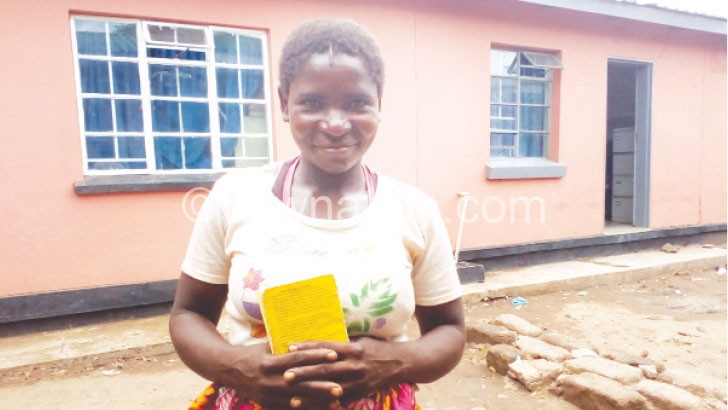A trip to Ngabu with Chamaca
It was very hot in Chikwawa on that Sunday morning when a group of journalists joined Queen Elizabeth Central Hospital’s Chatinkha Maternity Care Support (Chamaca) at a screening exercise at Ngabu Rural Hospital.
Led by Chamaca chairperson Professor Frank Taulo, the group arrived at the rural hospital around 10am, but the temperature was already above 30 degrees Celsius.
Everyone at the hospital was sweating profusely. But this did not deter the team from getting down to work.
Women from surrounding villages and beyond had started queuing for the screening exercises as early as 7am.
Flossy Chideya, 35, from Traditional Authority Ngabu, said she was compelled to go for screening after a friend told her how she lost her mother to cervical cancer.

“The woman was suffering, but did not know the root cause of the problem. She spent years taking concoctions and by the time she went to the hospital, the cancer was at an advanced stage and she eventually died,” said the mother of four.
Adding to Chideya’s sentiments, Eunice Ngwira, 34, from the same area, brushed aside rumours that cervical cancer screening is painful.
She said: “There is nothing to be afraid of. I have gone through it and it wasn’t painful at all.
“Screening gives peace of mind because when you test negative you know you are safe from cervical cancer.
“In instances where you test positive, the doctor advises you on which treatment you need to take to get well.”
After close to an hour of work, a woman aged 32 (name withheld) came out from the screening room wearing a gloomy face. Even though she tried hard to hide her sorrow, tears could be seen trickling down her cheeks.
This was the first suspected cervical cancer case for the day, and from Taulo’s explanation, it was at an advanced stage.
The woman was visibly in deep pain and she struggled to sit as she listened to the renowned gynaecologist and obstetrician.
Said Taulo to the woman: “Give me your contact number. I am taking your specimen to Blantyre to confirm the diagnosis. Depending on the outcome, we will advise you to come to Queen Elizabeth Central Hospital for treatment.
“Don’t worry everything is going to be alright. For now, I will prescribe to you some meds to relieve the pain.”
At the end of the day, close to 200 women had been screened and three suspected cervical cancer cases were recorded.
Grace Gama, not her real name, was another suspected cancer patient on the day.
However, unlike the first patient, she accepted her situation.
Gama expressed hope that the doctors would be able to assist her and she will beat the cancer.
“I rushed for screening the moment I heard doctors were coming here. For a long time, I have been having constant pains after urinating.
“I had suspected something was wrong with me and I am glad I now know the genesis of my problem,” she said.
Taulo said Gama’s cancer could be at stage 2 and he assured her that they will burn the cancer cells through chemotherapy.
He expressed concern that lack of access to quality health care services is putting more women in rural areas at risk of developing cervical cancer.
According to recent projections, Malawi has 18 000 cancer cases, 8 000 of which are cervical cancer.
Speaking three weeks ago during Chamaca’s Dinner and Dance, one of its fundraising activities, First Lady Monica Chakwera commended the team and various donors for their dedication towards the welfare of women in the country.
“We have learnt that screening can reduce cervical cancer by 80 percent, it is imperative to encourage and mobilise more women to go for screening,” she said.
Minister of Health Khumbize Chiponda expressed worry that cervical cancer, which is the easiest to prevent, is killing a lot of women in the country.
The disease, which accounts for 45 percent of all cancer cases, is the number one killer among all cancers in women.
Annully, Malawi is losing up to 2 000 women to cervical cancer while 4 000 new cases are registered annually.
Said Chiponda: “The women we are losing to cancer could have been productive and contributed towards the development of the country.”
She said Malawi has about 311 public health facilities offering cervical cancer screening, adding that the government plans to construct more health facilities and train more healthcare workers to promote primary health care.
More than 600 women have so far been screened for cervical cancer in Chikwawa and Nsanje through the Chamaca initiative.
Taulo said the group will continue with awareness and screening exercise. It targets to reach about 500 000 women across the country by December next year.
Driving back to Blantyre, he explained his passion to save women and how satisfied he was to have assisted those women to go through the screening.
Taulo said there is more that needs to be done.
“As gynaecologists, we come across many appalling cervical cancer cases. It’s sad because this is the easiest cancer to prevent but it is killing a lot of women in the country.
“As a nation, we need to invest more in screening because when detected early, cervical cancer is manageable,” he said.





